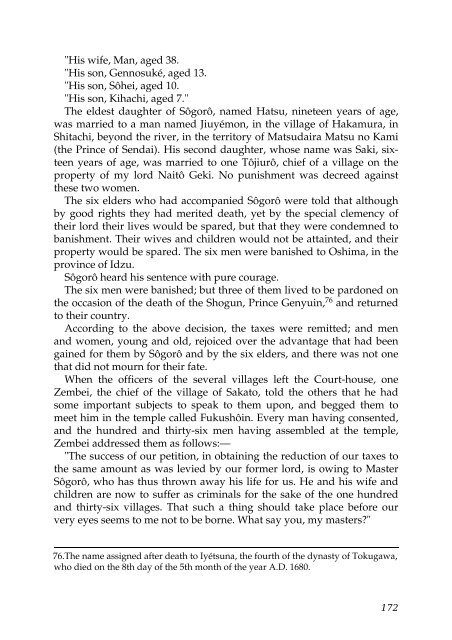You also want an ePaper? Increase the reach of your titles
YUMPU automatically turns print PDFs into web optimized ePapers that Google loves.
"His wife, Man, aged 38.<br />
"His son, Gennosuké, aged 13.<br />
"His son, Sôhei, aged 10.<br />
"His son, Kihachi, aged 7."<br />
The eldest daughter <strong>of</strong> Sôgorô, named Hatsu, nineteen years <strong>of</strong> age,<br />
was married to a man named Jiuyémon, in the village <strong>of</strong> Hakamura, in<br />
Shitachi, beyond the river, in the territory <strong>of</strong> Matsudaira Matsu no Kami<br />
(the Prince <strong>of</strong> Sendai). His second daughter, whose name was Saki, sixteen<br />
years <strong>of</strong> age, was married to one Tôjiurô, chief <strong>of</strong> a village on the<br />
property <strong>of</strong> my lord Naitô Geki. No punishment was decreed against<br />
these two women.<br />
The six elders who had accompanied Sôgorô were told that although<br />
by good rights they had merited death, yet by the special clemency <strong>of</strong><br />
their lord their lives would be spared, but that they were condemned to<br />
banishment. Their wives and children would not be attainted, and their<br />
property would be spared. The six men were banished to Oshima, in the<br />
province <strong>of</strong> Idzu.<br />
Sôgorô heard his sentence with pure courage.<br />
The six men were banished; but three <strong>of</strong> them lived to be pardoned on<br />
the occasion <strong>of</strong> the death <strong>of</strong> the Shogun, Prince Genyuin, 76 and returned<br />
to their country.<br />
According to the above decision, the taxes were remitted; and men<br />
and women, young and old, rejoiced over the advantage that had been<br />
gained for them by Sôgorô and by the six elders, and there was not one<br />
that did not mourn for their fate.<br />
When the <strong>of</strong>ficers <strong>of</strong> the several villages left the Court-house, one<br />
Zembei, the chief <strong>of</strong> the village <strong>of</strong> Sakato, told the others that he had<br />
some important subjects to speak to them upon, and begged them to<br />
meet him in the temple called Fukushôin. Every man having consented,<br />
and the hundred and thirty-six men having assembled at the temple,<br />
Zembei addressed them as follows:—<br />
"The success <strong>of</strong> our petition, in obtaining the reduction <strong>of</strong> our taxes to<br />
the same amount as was levied by our former lord, is owing to Master<br />
Sôgorô, who has thus thrown away his life for us. He and his wife and<br />
children are now to suffer as criminals for the sake <strong>of</strong> the one hundred<br />
and thirty-six villages. That such a thing should take place before our<br />
very eyes seems to me not to be borne. What say you, my masters?"<br />
76.The name assigned after death to Iyétsuna, the fourth <strong>of</strong> the dynasty <strong>of</strong> Tokugawa,<br />
who died on the 8th day <strong>of</strong> the 5th month <strong>of</strong> the year A.D. 1680.<br />
172



